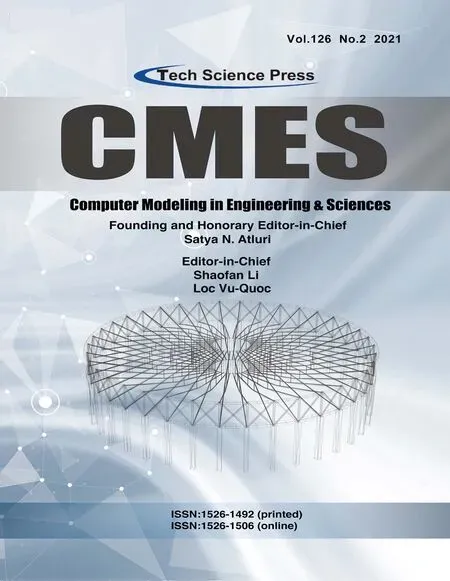Introduction to the Special Issue on Novel Methods for Reliability Evaluation and Optimization of Complex Mechanical Structures
Feng Zhangand Yangjun Luo
1School of Mechanics,Civil Engineering and Architecture,Northwestern Polytechnical University,Xi’an,710129,China
2Province Key Laboratory of Advanced Technology for Aerospace Vehicles,School of Aeronautics and Astronautics,Dalian University of Technology,Dalian,116024,China
3State Key Laboratory of Structural Analysis for Industrial Equipment,Dalian University of Technology,Dalian,116024,China
Reliability of mechanical structures is an important issue in the engineering field,especially in the field of aerospace and other high-tech sophisticated fields.Up to now,reliability-based evaluation and optimization methods have been widely applied in the safety analysis and design of mechanical structures.Many advanced algorithms for significantly improving the calculation efficiency and accuracy of solutions have been developed and gained successful applications in real engineering problems.Recently,with the advantages of strong versatility and well global-searching ability,more and more attention has been paid to the intelligent algorithm of mechanical structure reliability optimization design.
In order to disseminate the recent advances in methods for reliability evaluation and optimization of complex mechanical structures in time,the two guest editors conceived the idea of organizing this Special Issue to our readers with interests.There are 11 peer-reviewed papers in this Special Issue,which are authored by researchers from research institutes and universities active in the topic of reliability.The Special Issue is dedicated to the innovative theory,model,technique,algorithm as well as optimization design.Specifically,topics across reliability evaluation index of complex mechanical structures,innovation and improvement of intelligent algorithms,fault analysis of complex mechanical structures,reliability evaluation based on intelligent algorithms and reliability optimization design in intelligent algorithms are included.
Specifically,“Robust Remaining Useful Life Estimation Based on an Improved Unscented Kalman Filtering Method” by Zhao et al.[1],proposes a robust RUL estimation approach to reduce the errors and randomness of estimation results for degradation problems of the linear relationship between the measured values and their degradation state;“A Local Sparse Screening Identification Algorithm with Applications” by Li et al.[2],proposes a local sparse screening identification algorithm (LSSI) to identify nonlinear systems;“Subinterval Decomposition-Based Interval Importance Analysis Method” by Wang et al.[3],proposes an interval important analytical method;“Research on Trajectory Tracking Method of Redundant Manipulator Based on PSO Algorithm Optimization” by Xu et al.[4],studies the trajectory tracking method of redundant manipulator based on Particle Swarm Optimization algorithm;“Robust Design Optimization and Improvement by Metamodel” by Song et al.[5],proposes two criteria to judge the optimal solution whether satisfies robustness requirement and suggested a robustness measure based on maximum entropy;“Reliability Analysis Based on Optimization Random Forest Model and MCMC” by Yang et al.[6],proposes a novel method of reliability analysis combining Monte Carlo Markov Chain with random forest algorithm;“A Bayesian Updating Method for Non-Probabilistic Reliability Assessment of Structures with Performance Test Data” by He et al.[7],proposes a Bayesian method based on multi-ellipsoid convex model and performance test data to evaluate the nonprobabilistic reliability of structures logically;“Machine Learning-Based Seismic Fragility Analysis of Large-Scale Steel Buckling Restrained Brace Frames”by Sun et al.[8],establishes a machine learning (ML)-based seismic fragility analysis framework to effectively assess the risk to structures under seismic loading conditions;“Sensitivity of Sample for Simulation-Based Reliability Analysis Methods” by Yuan et al.[9],regards the sensitivities of the failure probability estimate and its statistical characteristics with regard to sample as ‘contribution indexes’to measure the contribution of sample;“A Fast Product of Conditional Reduction Method for System Failure Probability Sensitivity Evaluation” by Yang et al.[10],applies the idea of failure mode relevancy to failure probability sensitivity analysis;“Stress Relaxation and Sensitivity Weight for Bi-directional Evolutionary Structural Optimization to Improve the Computational Efficiency and Stabilization on Stress-based Topology Optimization” by Ma et al.[11],proposes an improved topology optimization method for the continuum structures considering stress minimization in the framework of the conventional BESO method.
As a final remark,it is hoped that the presented topics will give this special issue a much more lasting value and make it appealing to a broad audience of researchers,practitioners,and students who are interested in reliability evaluation and optimization of complex mechanical structures,and each reader can find in this special issue something useful or inspiring.
Acknowledgement:The contributions of the authors and the reviewers to this Special Issue are appreciated by the organizers.We also would like to thank the journal of CMES for the supports for publications of this Special Issue.
Funding Statement:This work has been supported by the Natural Science Foundation of Shaanxi Province (2019JM-377),the Fundamental Research Funds for the Central Universities (NWPU-310202006zy007).
Conflicts of Interest:The authors declare that they have no conflicts of interest to report regarding the present study.
 Computer Modeling In Engineering&Sciences2021年2期
Computer Modeling In Engineering&Sciences2021年2期
- Computer Modeling In Engineering&Sciences的其它文章
- Introduction to the Special Issue on Modeling and Simulation of Fluid Flows in Fractured Porous Media:Current Trends and Prospects
